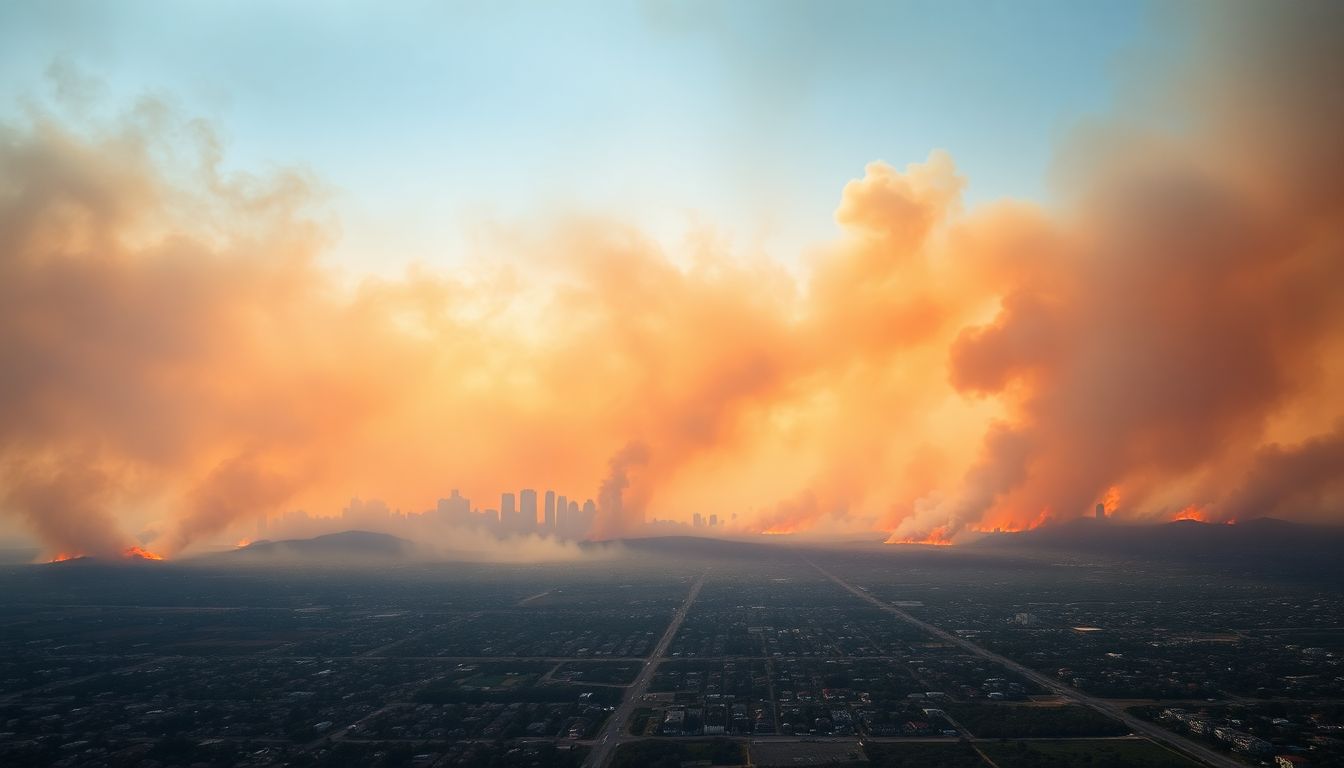
The threat of wildfires looms large over Los Angeles in 2025. As temperatures rise and drought persists, the risk of a catastrophic fire increases. Understanding this danger is essential for residents to prepare effectively and respond swiftly.
The Increasing Risk of Wildfires in Los Angeles
Wildfires are becoming more frequent and intense in California. Between 2020 and 2023, the state has seen an alarming rise in the number of wildfires, with increased acreage burned each year. The Los Angeles area isn’t exempt from these trends.
Recent Wildfire Trends and Statistics
- In 2023, over 150,000 acres burned across the state.
- The number of wildfires in California has surged by 25% since 2019.
- Major fires in LA County have doubled in size compared to five years ago.
The Human and Economic Cost of Wildfires
The human toll is staggering:
- Thousands of people are forced to evacuate their homes.
- Lives are lost, with communities shattered by destruction.
Economically, wildfires cost California billions:
- Estimated damages from recent fires exceed $10 billion.
- Rebuilding efforts place additional strain on state resources.
Understanding the Causes of LA Wildfires
Understanding what causes wildfires helps in prevention and preparedness.
Climate Change and its Impact on Wildfire Risk
Rising temperatures and prolonged droughts create favorable conditions for fires. Climate change has led to hotter summers and drier winters, creating a perfect storm for wildfires to ignite and spread.
Role of Human Activities in Starting Wildfires
Humans are often the spark. Poorly managed campfires, discarded cigarettes, or even downed power lines contribute significantly to wildfire outbreaks.
The Importance of Fuel Management in Preventing Wildfires
Proper fuel management can stop fires before they start. This includes:
- Clearing dead vegetation.
- Maintaining defensible space around homes.
Preparing for Wildfire Season in Los Angeles
Being ready can make all the difference when wildfire season hits.
Creating a Family Emergency Plan and Communication Strategy
Have a plan in place:
- Designate a meeting spot.
- Keep emergency contact information easily accessible.
Preparing Your Home for Wildfire: Defensible Space and Hardening
Create defensible space by:
- Trimming trees and shrubs within 30 feet of your home.
- Using fire-resistant materials for roofs and decks.
Essential Supplies for Wildfire Evacuation and Survival
Pack essential supplies:
- Water (one gallon per person per day for at least three days)
- Food (non-perishable, easy-to-prepare items)
- First aid kit
- Flashlight and batteries
Wildfire Evacuation Procedures and Safety Measures
Evacuating safely is crucial to protect yourself and your family.
Understanding Evacuation Warnings and Orders
Know the difference between:
- Evacuation Warnings: Prepare for possible evacuation.
- Evacuation Orders: Leave immediately.
Safe Evacuation Routes and Emergency Shelters
Have escape routes planned. Local officials will provide information on the safest paths. Look for nearby emergency shelters, which can be lifesavers during a wildfire.
Protecting Yourself and Your Family During Evacuation
Stay calm and focused:
- Follow your emergency plan.
- Avoid driving through smoke or fire.
Recovering from a Wildfire in Los Angeles
The aftermath of a wildfire is daunting. Recovery takes time and effort.
Assessing Damage to Your Home and Property
After returning home, assess damages carefully:
- Document everything with photos.
- Separate items that can be salvaged from those that cannot.
Navigating Insurance Claims and Financial Aid
File claims promptly with your insurance provider. Keep records of:
- Damage assessments
- Repair estimates
Explore state and federal financial aid options available for wildfire recovery.
Rebuilding Your Life After a Wildfire
Rebuilding can feel overwhelming. Seek community support and take it one step at a time. Setting small, achievable goals can help.
Post-Wildfire Resources and Support
Support is available after a wildfire event to help you rebuild.
Government Assistance Programs and Resources
Both state and federal programs can assist survivors. These programs provide financial relief and rebuilding resources.
Community Support Networks and Organizations
Local organizations, like the Red Cross, offer assistance with shelter, food, and supplies. Engaging with community groups can also build support networks during recovery.
Mental Health Support for Wildfire Survivors
Wildfires can take a toll on mental health. Access counseling services and helplines geared specifically toward disaster survivors. Talking about experiences can foster healing.
Conclusion: Building a Resilient Los Angeles
Learning from each wildfire season makes Los Angeles stronger.
Key Takeaways: Preparing for and Recovering from Wildfires
- Create a family emergency plan.
- Ensure your home is defensible.
- Stay informed on evacuation procedures.
The Importance of Community Preparedness
Communities that prepare together recover together. Engage in community preparedness initiatives and share resources.
Looking Ahead: Mitigation Strategies for Future Wildfire Seasons
Continued efforts in fuel management, education, and infrastructure improvements are vital. Together, we can lessen the impact of wildfires in Los Angeles.
Stay prepared, stay informed, and support one another through challenges.



